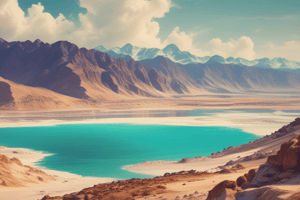Podcast
Questions and Answers
The Greatest Generation experienced the devastation of World War II and the economic challenges of the Great Depression.
The Greatest Generation experienced the devastation of World War II and the economic challenges of the Great Depression.
True (A)
The Silent Generation grew up during the turmoil of World War I and the subsequent Cold War.
The Silent Generation grew up during the turmoil of World War I and the subsequent Cold War.
False (B)
The Silent Generation is known for their outspokenness about their personal experiences.
The Silent Generation is known for their outspokenness about their personal experiences.
False (B)
The Baby Boomer generation emerged during the post-war economic boom.
The Baby Boomer generation emerged during the post-war economic boom.
The Silent Generation is known for their optimistic approach to life.
The Silent Generation is known for their optimistic approach to life.
Generation X came of age during the rise of the internet, the fall of the Berlin Wall, and the shift from a manufacturing-based economy to a service-based one.
Generation X came of age during the rise of the internet, the fall of the Berlin Wall, and the shift from a manufacturing-based economy to a service-based one.
Millennials are often characterized by their commitment to personal growth and their adaptability.
Millennials are often characterized by their commitment to personal growth and their adaptability.
Generation Z is known for their focus on social justice, digital nativity, and their concern for the environment.
Generation Z is known for their focus on social justice, digital nativity, and their concern for the environment.
Baby Boomers are often characterized by their skepticism of established institutions and their commitment to personal growth.
Baby Boomers are often characterized by their skepticism of established institutions and their commitment to personal growth.
The beliefs and behaviors of different generations are significantly influenced by geography, as it exposes them to unique social, political, and economic events.
The beliefs and behaviors of different generations are significantly influenced by geography, as it exposes them to unique social, political, and economic events.
Flashcards are hidden until you start studying
Study Notes
Geography and Generations
Geography plays a significant role in shaping the beliefs and behaviors of different generations, as it influences their formative years and exposes them to unique social, political, and economic events. This article will explore the impact of geography on various generations and how their distinct experiences shape their attitudes and perspectives.
The Greatest Generation (1901-1924)
Born during the early 20th century, the Greatest Generation experienced the devastation of World War I and the economic challenges of the Great Depression. Their formative years were marked by hardship and a collective determination to rebuild society. As a result, this generation developed a strong sense of community and patriotism.
The Silent Generation (1925-1945)
Following the Greatest Generation, the Silent Generation grew up during the turmoil of World War II and the subsequent Cold War. Their experiences with rationing, evacuations, and the fear of nuclear war shaped their attitudes towards authority and the world around them. This generation is known for their pragmatic approach to life and their silence about their personal experiences.
Baby Boomers (1946-1964)
The Baby Boomer generation emerged during the post-war economic boom and the rise of the nuclear family. Their formative years were marked by prosperity, societal changes, and the civil rights movement. Baby Boomers are often characterized by their idealistic views and their commitment to personal growth.
Generation X (1965-1980)
Generation X came of age during the rise of the internet, the fall of the Berlin Wall, and the shift from a manufacturing-based economy to a service-based one. Their experiences with technology and globalization have shaped their attitudes towards innovation and the future. This generation is known for their adaptability and their skepticism of established institutions.
Millennials (1981-1995)
Millennials, also known as Generation Y, grew up during the rise of social media, the global financial crisis, and the Arab Spring. Their formative years were marked by connectedness, globalization, and the increasing importance of technology in daily life. Millennials are often characterized by their diverse backgrounds, their commitment to social causes, and their openness to new ideas.
Generation Z (1996-2010)
Generation Z is the most diverse generation in history, having grown up in a highly connected digital world and faced a global pandemic. Their formative years were shaped by the rise of social media, the increasing importance of technology in education, and the environmental challenges posed by climate change. This generation is known for their focus on social justice, their digital nativity, and their concern for the environment.
Conclusion
Geography has a significant impact on the beliefs and behaviors of different generations, as it influences their formative years and exposes them to unique social, political, and economic events. Understanding the diverse experiences and perspectives of each generation can help foster better communication and collaboration across generations.
Studying That Suits You
Use AI to generate personalized quizzes and flashcards to suit your learning preferences.




